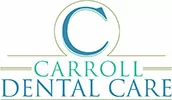TMJ & TMD
Having good oral health involves taking care of more than just your teeth and gums. That’s why our team at Carroll Dental Care offers treatment options to keep your jaw healthy, including treatments for TMJ pain.
What Is TMJ/TMD?
Though the two terms are often used interchangeably, they have different meanings. TMJ is the acronym for the temporomandibular joint. This is the small joint that connects your jaw to your skull. When this area experiences chronic pain and discomfort, it is known as TMJ disorder—or TMD.
TMJ disorder happens when surrounding muscles cause chronic discomfort and pain through not just your jaw, but through your head, neck, and shoulders as well. Any type of chronic pain can be debilitating, but when it affects how you eat and speak it’s even more important to find treatment right away. That’s why our team at Carroll Dental Care is here to help you!
What Causes TMJ?
TMJ disorder can be caused by a number of issues. Some of these issues are things outside of our control: arthritis, misalignment of the teeth or jaw, accident or traumatic injury to the TMJ area.
Other TMJ causes are things that we naturally do in response to stress or anxiety: teeth grinding or clenching, poor posture, stress, and even things like excessive gum chewing. TMJ Symptoms
You might be dealing with TMJ or TMD if you have been experiencing any of the following for an extended period of time:
Jaw Pain | Jaw pain is the hallmark of TMD. Usually it will be located right on the TMJ itself—on the hinge where your jaw connects with your skull and controls your mouth movement. This kind of symptom is often a result of grinding teeth at night or subconsciously throughout the day.
Difficulty Chewing | If you’ve found it to be difficult to chew, you might be dealing with TMJ. This type of difficulty chewing is characterized by a feeling of exhaustion or tiredness in the jaw as you eat.
Clicking, or Locking of Jaw | Any sort of clicking or popping noise in the jaw could indicate TMJ disorder. If your jaw often locks as well, that’s also a sign that things aren’t right in your TMJ
Pain in Face, Ear, or Mouth | You may also experience TMJ ear pain, face pain, or general pain in your mouth. Each of these can be the result of the muscles in those areas responding to the pain of TMJ.
Tenderness in Jaw | If your jaw is tender to touch or move, it’s likely you’re dealing with some level of TMD.
Headache | It won’t be uncommon for you to deal with a TMJ headache. Pain in your jaw can cause outlying pain to occur in other parts of your face, sometimes resulting in things like headaches. You may also experience aching muscles down through your neck and shoulders as well.
Muscle Spasms | The muscles around your jaw can tighten up in response to TMJ, causing persistent muscle spasms.
If you have one or more of these symptoms occurring frequently, call our team at Carroll Dental Care for a TMJ consultation right away!
TMJ Treatment
Here at Carroll Dental Care, we can help find your answer to TMJ pain relief! TMD can be caused by many things; therefore, how to treat TMJ isn’t a one-solution-fix-all either. However, with help from our caring dental team, and a combination of the following treatments, you might just see a decrease in your symptoms and pain levels.
Medication | Medication can take care of headaches and general pain in the body, that’s why it can provide you with TMJ relief.
Physical Therapy | The type of pain you might be experiencing could be addressed with TMJ exercises through physical therapy. Some of these could include stretching the jaw from side to side or up and down.
Night Guard for TMJ | A mouth guard for teeth grinding can make a big difference in your oral health. Some people may have bruxism, a chronic condition of subconsciously grinding teeth in sleep or when awake. For many others, grinding teeth can be a subconscious act often occurring in response to strong emotions like anxiety, stress, or anger.
Teeth grinding can damage teeth as well as cause jaw pain, so a night guard for teeth grinding can protect your teeth as well as treat your TMJ pain.
Whatever symptoms you are experiencing with your TMJ disorder, we can help find a solution to treat your pain—whether that is helping you learn how to stop grinding teeth at night, or providing you with the right pain reliever or physical therapy treatment. Our caring professionals at Carroll Dental Care are here for you!
Call Carroll Dental Care for TMJ Relief
Get in touch with Dr. Carroll, your TMJ dentist, today with any questions about TMJ. We’re here to help you minimize your jaw pain and get you on the road to recovery.
